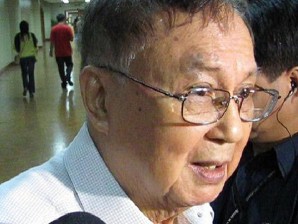Apart from outliving its usefulness, the Presidential Commission on Good Government (PCGG) has not done its duty of preventing the recurrence of ill-gotten wealth cases in almost 27 years of its existence, according to Sen. Joker Arroyo.
Arroyo on Sunday noted, however, that the PCGG did not have it easy when it began its job of identifying irregularly acquired assets of the Marcoses and their cronies after its creation in 1986.
In a radio interview, Arroyo said the PCGG faced a blank wall since information about assets of the Marcoses and their cronies were few and hard to come by, given the circumstances in post-martial law Philippines.
“During martial law, nobody knew about ill-gotten cases because the press was controlled. I don’t think the PCGG had any idea in the beginning. [It was only] along the way that they (PCGG officials) discovered things,” said Arroyo, who was the first executive secretary of then President Corazon Aquino.
The PCGG was created through Executive Order No. 1, the first edict that Corazon Aquino signed shortly after entering Malacañang.
Arroyo said it was Jovito Salonga, a former senator, who drafted the EO creating the PCGG. He was also the commission’s first chairman before he again ran for senator and became Senate president in 1987.
“The way I saw it, and let me say I was not directly involved in the PCGG’s recovery efforts, the PCGG officials did not know the extent, depth and width of the properties it was supposed to recover,” Arroyo added.
It was PCGG Chairman Andres Bautista who recently recommended to President Aquino that the commission wind down its operations and transfer its work to the Department of Justice (DOJ).
The family of the late dictator Ferdinand Marcos was believed to have amassed $10 billion, of which some $4 billion has been recovered by the PCGG.
“If there are still leads and everything, the DOJ can follow that through already. But how sure is Bautista that $10 billion is all there is?” Arroyo said.
The senator said the PCGG had already outlived its usefulness, adding that time was not on the commission’s side in its recovery efforts.
Inventory
Almost 27 years after the PCGG was created, any ill-gotten wealth that remains unrevealed to the commission may have already changed hands or may have been further disguised, he said.
Arroyo said the DOJ must demand an inventory of the properties that the PCGG had been able to recover since 1986.
Asked why neither a Marcos kin nor crony had yet been imprisoned for ill-gotten wealth, Arroyo said that a case filed by the PCGG was considered a civil suit.
“The PCGG gathers evidence about a property and the Office of the Solicitor General would be the one to prosecute,” he explained.
Never again
“But whether the PCGG has actually recovered anything, I cannot answer that,” Arroyo added with a chuckle.
A provision of EO 1 says the commission is required to ensure that ill-gotten cases “never happen again,” something the PCGG has apparently failed to do, he said.
“To recover ill-gotten wealth and that [its acquisition] should never happen again but it has. Apart from EO No. 1, there is Executive Order No. 2 that also states [the acquisition of ill-gotten wealth] should never happen again. There should be lesson. But it is happening again, eh,” he observed.
Arroyo acknowledged that while the PCGG’s intentions were good, its mission of recovering ill-gotten wealth as mandated during the revolutionary government of the first Aquino administration was cramped by the ratification of the 1987 Constitution.
He said some sectors demanded that the PCGG be exempt from the due process clause under the Bill of Rights of the Constitution to allow it to continuously sequester properties from the Marcos family and its cronies.
“But the Constitutional Commission (that drafted the charter) did not agree. And so the cronies later invoked the Bill of Rights after the Constitution was ratified to evade recovery efforts,” he said.
Originally posted: 4:27 pm | Sunday, January 6th, 2013
